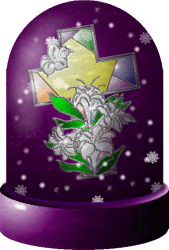| EASTER: HOW IT ALL BEGAN 
The name "Easter" probably originated with the names of an ancient goddess. The Venerable Bede first asserted in his book De Ratione Temporum that Easter was named after Eostre (a.k.a. Eastre). She was the Great Mother Goddess of the Saxon people in Northern Europe. Similar "Teutonic dawn goddess of fertility [were] known variously as Ostare, Ostara, Ostern, Eostra, Eostre, Eostur, Eastra, Eastur, Austron and Ausos." Her name was derived from the ancient word for spring: "eastre." Similar goddesses were known by other names in ancient cultures around the Mediterranean, and were celebrated in the springtime. Some were Aphrodite from Cyprus, Astarte from Phoenicia, Demeter from Mycenae, Hathor from Egypt, Ishtar from Assyria, Kali from India, and Ostara, a Norse Goddess of fertility. An alternate explanation has been suggested. The name given by the Frankish church to Jesus' resurrection festival included the Latin word alba which means white. This was a reference to the white robes that were worn during the festival. Alba also has a second meaning, sunrise. When the name of the festival was translated into German, the sunrise meaning was selected in error. This became ostern in German. Ostern has also been proposed as the origin of the word Easter. Many, perhaps most, pagan religions in the Mediterranean area had a major seasonal day of religious celebration at or following the Spring Equinox. Cybele, the Phrygian fertility goddess, had a fictional consort who was believed to have been born via a virgin birth. He was Attis, who was believed to have died and been resurrected each year during the period March 222 to March 25. "About 200 B.C. mystery cults began to appear in Rome just as they had earlier in Greece. Most notable was the Cybele cult centered on Vatican hill ...Associated with the Cybele cult was that of her lover, Attis ([the older Tammuz, Osiris, Dionysus, or Orpheus under a new name). He was a god of ever-reviving vegetation. Born of a virgin, he died and was reborn annually. The festival began as a day of blood on Black Friday and culminated after three days in a day of rejoicing over the resurrection," the Bede noted. Wherever Christian worship of Jesus and pagan worship of Attis were active in the same geographical area in ancient times, Christians "used to celebrate the death and resurrection of Jesus on the same date; and pagans and Christians used to quarrel bitterly about which of their gods was the true prototype and which the imitation." Many religious historians believe that the death and resurrection legends were first associated with Attis, many centuries before the birth of Jesus. They were simply grafted onto stories of Jesus’s life in order to make Christian theology more acceptable to pagans. Others suggest that many of the events in Jesus' life that were recorded in the gospels were lifted from the life of Krishna, the second person of the Hindu Trinity. Ancient Christians had an alternate explanation; they claimed that Satan had created counterfeit deities in advance of the coming of Christ in order to confuse humanity. Modern-day Christians generally regard the Attis legend as being a pagan myth of little value. They regard Jesus' death and resurrection account as being true, and unrelated to the earlier tradition. Religious followers from around the world observe many seasonal days of celebration during March and April. Most are religious holy days, and are linked in some way to the spring or vernal equinox. On that day, the daytime and nighttime hours are approximately equal -- each being 12 hours long. Christianity and other religious associate three themes with the vernal equinox: Conception and pregnancy leading to birth on the winter solstice; victory of a god of light (or life, rebirth, resurrection) over the powers of darkness (death); and the descent of the goddess or god into the underworld for a period of three days. This is such a popular theme among religions that mythologists refer to it as "the harrowing of Hell." Among the Roman Catholic church and Protestant denominations, Easter Sunday falls on the first Sunday after the first full moon after March 20, the nominal date of the Spring Equinox. Its ancient linkages to sun and moon worship are obvious. Many sources state that the starting date of the calculation is the actual day of the Equinox rather than the nominal date of March 20. Easter Sunday can fall on any date from March 22 to April 25. Prior to A.D. 325, Easter was variously celebrated on different days of the week, including Friday, Saturday, and Sunday. In that year, the Council of Nicaea was convened by emperor Constantine. It issued the Easter Rule which states that Easter shall be celebrated on the first Sunday that occurs after the first full moon on or after the vernal equinox. However, a caveat must be introduced here. The "full moon" in the rule is the ecclesiastical full moon, which is defined as the fourteenth day of a tabular lunation, where day 1 corresponds to the ecclesiastical New Moon. It does not always occur on the same date as the astronomical full moon. The ecclesiastical "vernal equinox" is always on March 21. Therefore, Easter must be celebrated on a Sunday between the dates of March 22 and April 25. The Cross is the symbol of the Crucifixion, as opposed to the Resurrection. However, at the Council of Nicaea, in A.D. 325, Constantine decreed that the Cross was the official symbol of Christianity. The Cross is not only a symbol of Easter, but it is more widely used, especially by the Catholic Church, as a year-round symbol of their faith. Easter is at the end of the Lenten season, which covers a forty-six-day period that begins on Ash Wednesday and ends with Easter. The Lenten season itself comprises forty days, as the six Sundays in Lent are not actually a part of Lent. Sundays are considered a commemoration of Easter Sunday and have always been excluded from the Lenten fast. The Lenten season is a period of penitence in preparation for the highest festival of the church year, Easter. Holy Week, the last week of Lent, begins its with the observance of Palm Sunday. Palm Sunday takes its name from Jesus' triumphal entry into Jerusalem where the crowds laid palms at his feet. Holy Thursday commemorates the Last Supper, which was held the evening before the Crucifixion. Friday in Holy Week is the anniversary of the Crucifixion, the day that Christ was crucified and died on the cross. Saturday is a day of mourning for the slain Christ, culminating in the rejoicing of the Resurrection on Sunday. 
CLICK THE CHICK TO GO TO THE NEXT PAGE! CELTIC CROSS BACKGROUND FROM ABSOLUTE WEB GRAPHICS PURPLE LAVA BACKGROUND BY FOREVER AMBER DANCING PEEP FROM JO'S WORLD GLOBE FROM CYBER2000 |
 Free Forum Hosting
Free Forum Hosting